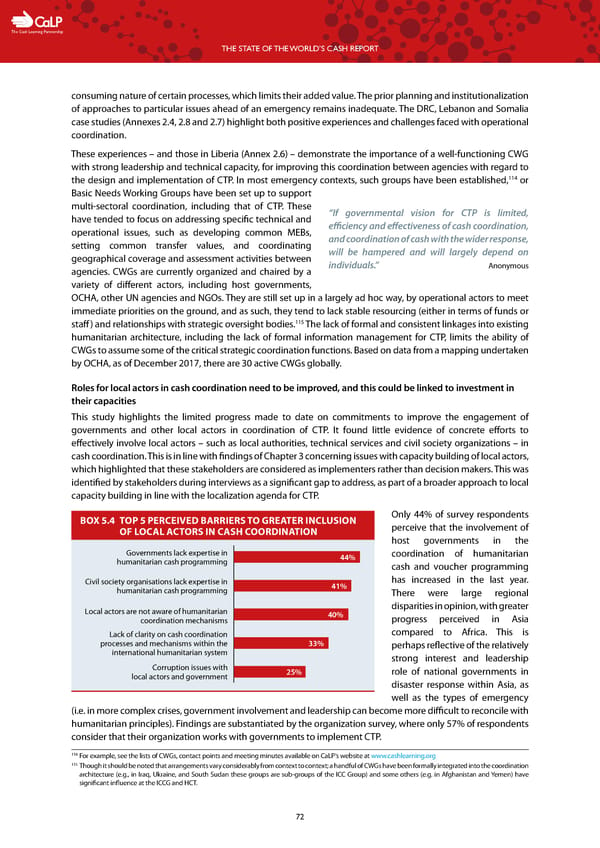C The Cash Learning Partnership THE STATE OF THE WORLD’S CASH REPORT consuming nature of certain processes, which limits their added value. The prior planning and institutionalization of approaches to particular issues ahead of an emergency remains inadequate. The DRC, Lebanon and Somalia case studies (Annexes 2.4, 2.8 and 2.7) highlight both positive experiences and challenges faced with operational coordination. These experiences – and those in Liberia (Annex 2.6) – demonstrate the importance of a well-functioning CWG with strong leadership and technical capacity, for improving this coordination between agencies with regard to 114 the design and implementation of CTP. In most emergency contexts, such groups have been established, or Basic Needs Working Groups have been set up to support multi-sectoral coordination, including that of CTP. These “If governmental vision for CTP is limited, have tended to focus on addressing specific technical and efficiency and effectiveness of cash coordination, operational issues, such as developing common MEBs, and coordination of cash with the wider response, setting common transfer values, and coordinating will be hampered and will largely depend on geographical coverage and assessment activities between individuals.” Anonymous agencies. CWGs are currently organized and chaired by a variety of different actors, including host governments, OCHA, other UN agencies and NGOs. They are still set up in a largely ad hoc way, by operational actors to meet immediate priorities on the ground, and as such, they tend to lack stable resourcing (either in terms of funds or 115 staff) and relationships with strategic oversight bodies. The lack of formal and consistent linkages into existing humanitarian architecture, including the lack of formal information management for CTP, limits the ability of CWGs to assume some of the critical strategic coordination functions. Based on data from a mapping undertaken by OCHA, as of December 2017, there are 30 active CWGs globally. Roles for local actors in cash coordination need to be improved, and this could be linked to investment in their capacities This study highlights the limited progress made to date on commitments to improve the engagement of governments and other local actors in coordination of CTP. It found little evidence of concrete efforts to effectively involve local actors – such as local authorities, technical services and civil society organizations – in cash coordination. This is in line with findings of Chapter 3 concerning issues with capacity building of local actors, which highlighted that these stakeholders are considered as implementers rather than decision makers. This was identified by stakeholders during interviews as a significant gap to address, as part of a broader approach to local capacity building in line with the localization agenda for CTP. BOX 5.4 TOP 5 PERCEIVED BARRIERS TO GREATER INCLUSION Only 44% of survey respondents OF LOCAL ACTORS IN CASH COORDINATION perceive that the involvement of host governments in the Governments lack expertise in 44% coordination of humanitarian humanitarian cash programming cash and voucher programming Civil society organisations lack expertise in 41% has increased in the last year. humanitarian cash programming There were large regional Local actors are not aware of humanitarian disparities in opinion, with greater coordination mechanisms 40% progress perceived in Asia Lack of clarity on cash coordination compared to Africa. This is processes and mechanisms within the 33% perhaps reflective of the relatively international humanitarian system strong interest and leadership Corruption issues with 25% role of national governments in local actors and government disaster response within Asia, as well as the types of emergency (i.e. in more complex crises, government involvement and leadership can become more difficult to reconcile with humanitarian principles). Findings are substantiated by the organization survey, where only 57% of respondents consider that their organization works with governments to implement CTP. 114 For example, see the lists of CWGs, contact points and meeting minutes available on CaLP’s website at www.cashlearning.org 115 Though it should be noted that arrangements vary considerably from context to context; a handful of CWGs have been formally integrated into the coordination architecture (e.g., in Iraq, Ukraine, and South Sudan these groups are sub-groups of the ICC Group) and some others (e.g. in Afghanistan and Yemen) have significant influence at the ICCG and HCT. 72
 The State of the World's Cash | Full Report Page 73 Page 75
The State of the World's Cash | Full Report Page 73 Page 75